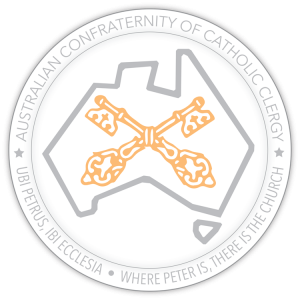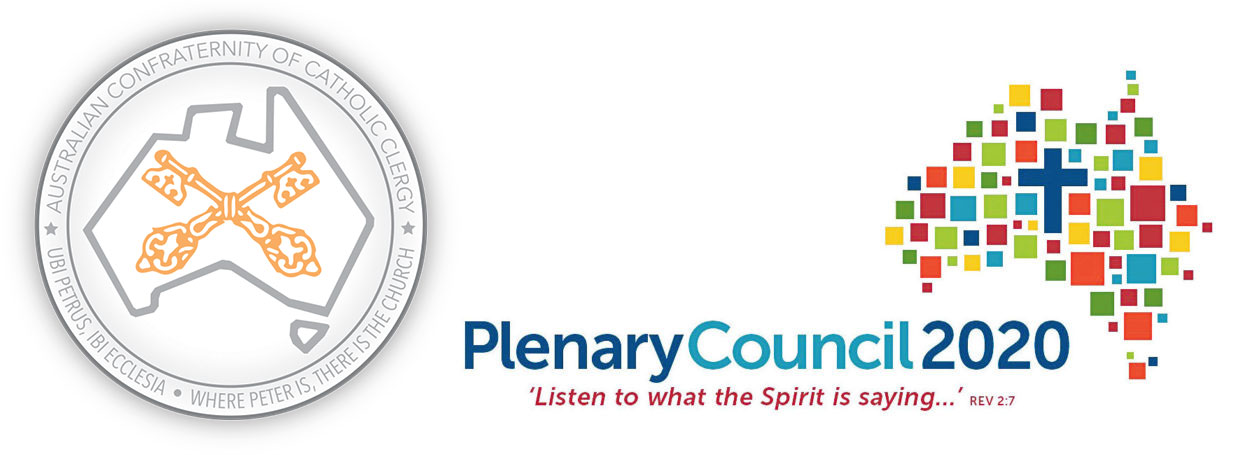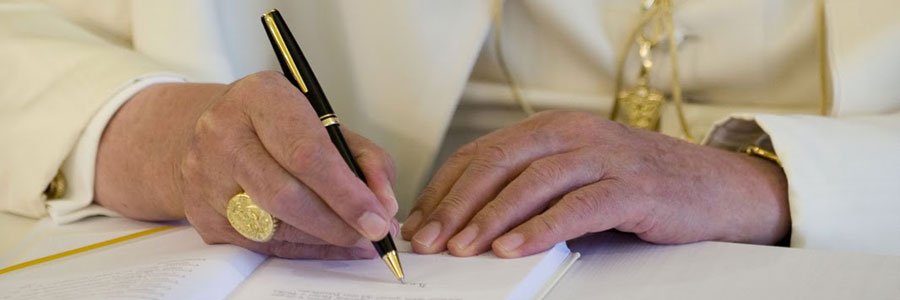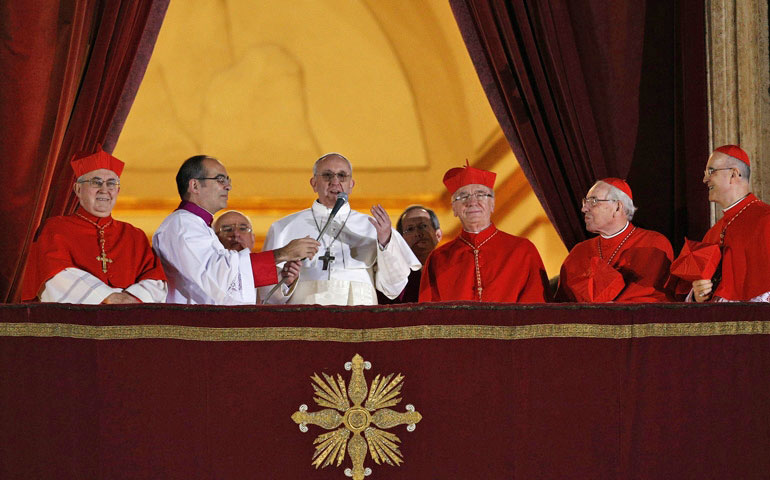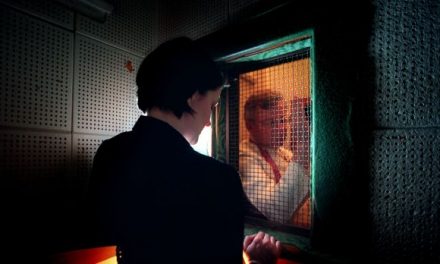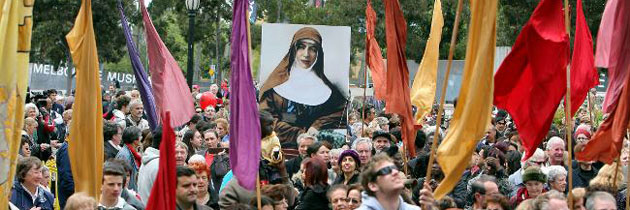SUBMISSION OF THE AUSTRALIAN CONFRATERNITY OF CATHOLIC CLERGY
TO THE PLENARY COUNCIL OF THE CATHOLIC CHURCH IN AUSTRALIA
Introduction
“Listen to what the Spirit is saying to the churches.” (Rev 2:29) It is one of the works of the Holy Spirit, promised by Christ at the Last Supper (Jn 16:13), to lead the Church into all truth. This does not mean that there will not be contradictions of faith and morals along the course of Church history, just that they are not the work of the Spirit. St Vincent of Lérins in his first Commonitory observed that it is necessary to distinguish development from alteration:
[C]are should be taken to ensure that it really is development and not alteration. Development implies that each point of doctrine is expanded within itself, while alteration indicates that a thing has been changed from what it was into something else. It is desirable then that developments should take place…but [this development] must be growth within the limits of its own nature, that is, within the framework of the same sense (“sensu”) and of the same meaning (“sententia”)….[A]lthough the size and outward appearance of an individual may change, it is still the same person, and the same nature….[I]t is right and fitting that there should be no discrepancy between the final result and the beginning.
St Vincent of Lérins, First Commonitory, PL 50, 667.
A plenary council has competence to make determinations on matters of discipline, in order to promote and cultivate the life of faith, which has been passed on in the sacred deposit of faith, and entrusted to the whole Church to be passed on until the end of time.[1] Canon 445 in the Code of Canon Law provides that the purpose of a particular council, of which a plenary council is a species (cf. heading of Chap. III of Book II), is to ensure that the pastoral needs of the people of God in its territory are provided for. Accordingly, the governing concept is the pastoral needs of the people of God, striving to pass on the inheritance of faith.
The canon then provides that a plenary council has power of governance, especially legislative power, which is to be applied to the purposes of an increase of faith, the ordering of common pastoral action, the direction of morals, and a common ecclesiastical discipline – its introduction, preservation, and defence. In other words, the work of a plenary council is to enact practical measures of governance which apply to each of the particular churches (the dioceses, eparchies, and the ordinariates) across the territory of the Bishops’ Conference. The history of previous plenary councils, both in Australia and elsewhere, demonstrates that the work of a plenary council is primarily legislative. In short, the purpose of a plenary council is to determine the best ways to promote Catholic faith and practice in contemporary society, not to enact attempted alterations to the deposit of faith.
The fact that there have been a significant number of submissions calling for changes to faith and morals is indicative of the profound crisis of belief in our time, particularly when those calls indicate the desire to substitute aspects of secular ideologies for aspects of the deposit of faith. That there is ignorance of the content and nature of that deposit, or that it is known but rejected, is a matter of foundational importance upon which every other question necessarily rests. Listening to the voices of all the faithful is right and necessary, but when there is widespread misunderstanding about the nature of the deposit of faith, it becomes an obligation of honesty – on the part of all the baptised, but especially the bishops – to ensure that it is clearly known and understood by all that the deposit of faith is not something of our own concoction or construction, but is to be received and embraced wholeheartedly, according to the Abrahamic and – even more – the Marian example.[2]
It is therefore plain that the plenary council must address courageously and forthrightly the root causes of this crisis, in order faithfully to carry-out its work. To fail to address this crisis would mean that not only will the plenary achieve little of enduring value, but it will in fact have failed in its most urgent task, a major opportunity will have been lost, and present difficulties will only be multiplied. In addition, the Church in Australia will be under-prepared to bear witness to Christ in the immediate future – with all the difficulties awaiting us, and which are obvious to all – unless there is a vigorously renewed embrace of the faith delivered once and for all, and its integral transmission to future generations boldly carried-out. This will require significant fortitude on the part of all the faithful, but particularly the bishops.
The membership of the Australian Confraternity of Catholic Clergy, in addition to pointing out the necessity outlined above, desires to make some specific recommendations on a number of matters ranging from the sacraments to terms of pastoral appointments to religious freedom and Catholic education, and is motivated by the perspective and experience of shepherds of souls in their – at times arduous, yet always rewarding – pastoral labours.
***
RECOMMENDATIONS
On the Sacrament of Penance
- That the use of the fixed grille be taken-up again in churches, chapels, etc.;
- that there be separate entrances to the confessional for penitent and confessor;
- and that there be the possibility of observing the custom of having a veil over the fixed grille.
- That priests be informed of their canonical right to insist on hearing confessions where there is a fixed grille, and, by implication, that it be recommended, if they so wish, according to the other conditions mentioned above, and to decline to hear them if these conditions aren’t met. (cf. Canon 964.2, to which an authentic interpretation was given by the Pontifical Council for the Interpretation of Legislative Texts, 7 July 1998 (AAS XC 1998 p.711]) Such a recommendation could be legislated by the plenary council.
- That it is not possible to accept the proposal to introduce the use of the third rite of reconciliation as a way of side-stepping mandatory reporting laws, given that general absolution is rightly reserved only for grave occasions in which the confession of sins is not possible. The auricular confession of sins is an integral part of the sacrament of penance by divine institution, as is implied in the words of the risen Christ to the apostles: “Those whose sins you absolve, they are absolved. Those whose sins you retain, they are retained.” (Jn 20:23) From this passage, it is clear that the individual confession of sins is needed in order that the confessor know what is to be absolved and what is to be retained. This is the reason for the condition which applies to general absolution that auricular confession be made at a later time, if possible. It thus follows that to omit the auricular confession of sins is not ordinarily possible in the celebration of the sacrament.
- That, mindful of the constant teaching of the popes, especially recent ones, including Pope Francis, with regard to the desirability of frequent recourse by all the faithful to the Sacrament of Penance, there be a renewed catechesis of both priests and faithful and the professional development of the clergy in relation to the celebration of the Sacrament of Penance, as a matter of urgency.
- That the provisions of both canon law and of the liturgical norms in relation to the celebration of the Sacrament of Penance be reiterated and specifically mandated by the Plenary Council as best protecting the integrity and the value of this divinely instituted means of reconciliation with God and the Church, as well as healing in this present time of spiritual and pastoral crisis.
On Pastoral Appointments
- That, mindful of the benefits of stability in ministry (cf. can. 522) and the requirements of consultation (cf. can. 524), the bishops give a more studied attention to the needs of both priests and faithful in appointing priests to parishes, so as to enable the development of mature and fruitful relationships between the laity and the priests ordained to serve them.
- That the practice of six year appointments, though enjoying a recognitio of some decades standing, be re-examined and the current practice changed with a view to fostering the ever greater need of stability of both laity and clergy.
On Catholic Education
Many of our members’ involvement in Catholic education has ensured that they are attuned to the significant decline in enrolments in some areas, and difficulties of various kinds in others. They are conscious at how challenging it can be to furnish our parish schools with educational professionals who are formed in the Catholic faith and participate in parish life. There is a growing awareness, also, that the corporation-style approach to Catholic education, with all of its bureaucratic necessities, needs revisiting in order to ensure that the principal aims of Catholic education can be achieved. With this in mind, we propose the following recommendation:
- one possible remedy to these difficulties, which will only continue to grow, presents itself in the notion of “schools of special character”, a phenomenon occurring in various regions: independent schools, organised and run usually by lay faithful who are in union with the local ordinary and involved at multiple levels in the local Church. Many members of the ACCC have attested to the growing interest these schools attract. We suggest that the Church in Australia – in particular the bishops — welcome and nurture this movement of the Spirit, which constitutes a new and hopeful chapter in Australia’s history of Catholic education.
On the Cultural Context
- The findings of the Royal Commission, as well as media reportage and commentary – and not a few Catholics – show a common misunderstanding about the nature of the Church as a monolithic behemoth, or, that it is made up somehow only of the pope and bishops and some bureaucratic structures. This unfortunate misunderstanding needs to be corrected urgently in the public square, notwithstanding the difficulties.
- The contradictory attitudes at the heart of certain ideologically motivated groups spells trouble not only for Catholics seeking to practise the faith in its fulness, but for society generally, as the undertones of totalitarian ideology now shift gears and become overtones. Not a few, under the pretext of freedom, seek to impose a one-sided version of it. The cultural polarisation that is its effect is a phenomenon that will only continue to grow with further encroachments upon free speech, freedom of conscience and freedom of religion. Within this dialectic there must be made a defence of the rights of Catholics to participate in public life with the same rights of every other citizen, knowing that to do so is by implication a defence of the rights of every Australian. This defence must be undertaken publicly, especially by lay Catholics.
- Clericalism, understood as the misuse of the clerical state for aims that are intrinsically contrary to it, should be countered by clearly pointing out that the misuse of the clerical state does not take away from the right use and living-out of that state, however much there may be claims in the mass media to the contrary. Given that, historically, totalitarian ideologies are to a greater or lesser extent anticlerical, a public defence of priests who strive to be good and faithful shepherds of those entrusted to their care will be a service not only to good priests, but to the freedom of religion in general.
- As human laws are changed to reflect the ideological dynamics at work in the political sphere, it is reasonable and just to require public assurances that Catholic hospitals and facilities, and Catholic schools and other educational institutes maintain the right to act in accordance with Catholic faith and morals, and not be coerced into contrary procedures and treatments, and to teach the Catholic faith, and not be coerced into teaching things contrary to it, as specific instances of the right of Australian citizens to freedom of conscience, freedom of religion, and freedom of speech.
[1] Cf. Catechism of the Catholic Church, St Paul’s, Strathfield, 1997, nos. 75-99.
[2] See Catechism of the Catholic Church, nos. 963-972.
